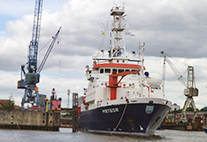Research vessel Meteor docks in hailing port Hamburg
19 June 2015, by Franziska Neigenfind

Photo: UHH/CEN/N. Jakobi
On Thursday afternoon, the German research vessel METEOR arrived at Norderwerft shipyard. It will stay in Hamburg before setting sail for the Baltic Sea on 23 July.
On Thursday afternoon, the German research vessel Meteor arrived at Norderwerft shipyard. It will stay in Hamburg before setting sail for the Baltic Sea on 23 July.
While in dock, the research ship’s main mast, hull, and cranes will get new protective coatings. Furthermore, the shipyard crew will service the Diesel generators, overhaul the lifeboats, and modernize the winch control. Please find an overview of all scheduled maintenance tasks here.
Built in 1986 and measuring roughly one-hundred meters, the Meteor has been employed on marine research expeditions the world over. It provides a joint research base for institutions all across Germany. The onboard facilities and equipment allow scientists to collect data, analyze air, water column, and sediment samples, map the seafloor, and conduct geophysical surveys. In early 2015, for instance, a team from the University's Center for Earth System Research and Sustainability (CEN) explored the archipelago Azores to assess the hazards of submarine volcano eruptions. “Our Meteor ranks among the world’s top 10 research ships,” says Prof. Detlef Quadfasel from the Control Station German Research Vessels at Universität Hamburg.
Video: The Meteor-captain presents his ship
published at the website of National Geographic Germany in April 2015
Heading back to Hamburg in the wake of their most recent research voyage, the scientists aboard the Meteor conducted numerous additional measurements. Tasked by the Federal Maritime and Hydrographic Agency (BSH) they investigated the actual efficiency of ballast water analyses. Ballast water is used to stabilize partially loaded ships. If cargo is added, any surplus water must be pumped out of the ballast water tanks in order to maintain the waterline. Last year, the METEOR was equipped with a ballast water treatment system in order to combat invasive aquatic species. Specially designed rapid tests are to verify the system’s effectiveness in the event of Port State Control (PSC) checks.
The Control Station German Research Vessels forms part of the CEN and is responsible for the Meteor's operational management. As the ship is property of the Federal Republic of Germany, its operations are financed by the Federal Ministry for Education and Research (BMBF) and the German Research Foundation (DFG).
More information:
